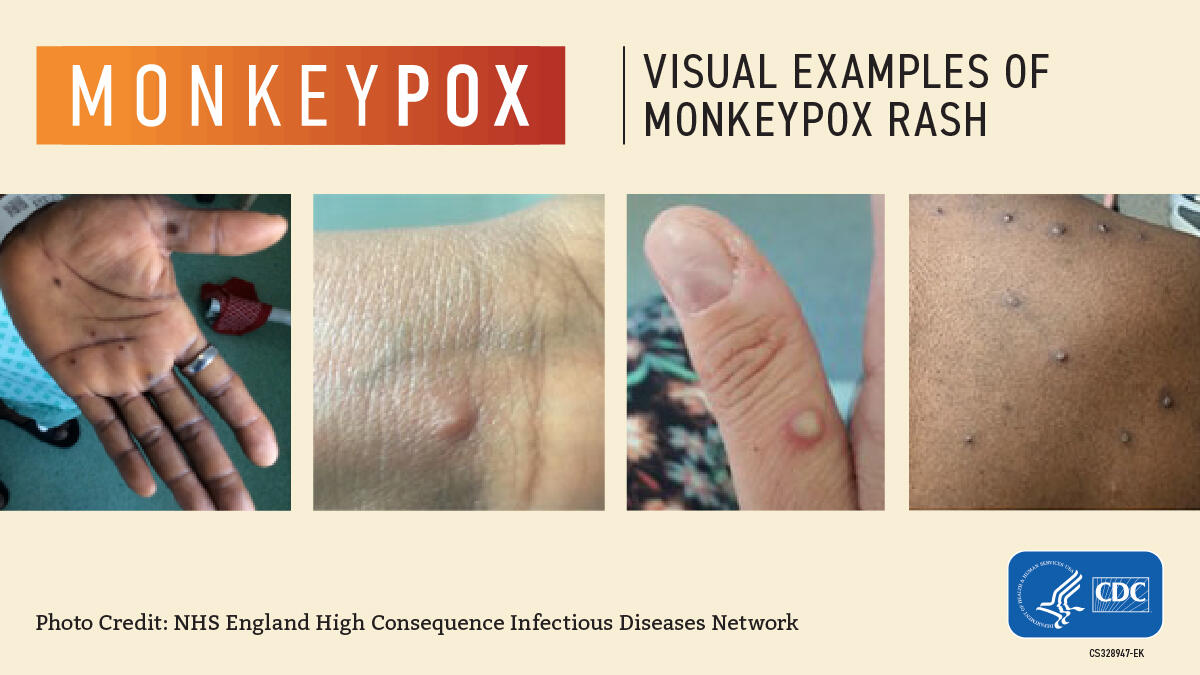Symptoms
Mpox might start with symptoms like the flu, with fever, low energy, swollen lymph nodes, and general body aches. Within 1 to 4 days (sometimes longer) after the appearance of fever, the person can develop a rash or sores. The sores will go through several stages, including scabbing, before healing. They can look like pimples or blisters and may be painful and itchy.
The rash or sores may be located on or near the genitals (penis, testicles, labia, and vagina) or anus (butt) but could also be on other areas like the hands, feet, chest, and face. They may also be limited to one part of the body.
People with mpox may experience all or only a few of these symptoms. Most will develop rash or sores. Some people have reported developing a rash or sores before (or without) the flu-like symptoms. Mpox can spread to others up to four days before symptoms start until all sores have healed and a fresh layer of skin has formed. This can take several weeks.
Transmission
Mpox spreads primarily through direct contact with infectious sores, scabs, or body fluids, including during sex, as well as activities like kissing, hugging, massaging, and cuddling. It can spread through touching materials used by a person with mpox that hasn’t been cleaned, such as clothing and bedding. It can also spread by respiratory secretions during prolonged, close, face-to-face contact.
-
Mpox can be spread through:
-
Direct skin-skin contact with rash lesions
-
Sexual/intimate contact, including kissing
-
Living in a house and sharing a bed with someone
-
Sharing towels or unwashed clothing
-
Environmental surfaces, particularly when in dark, cool, and low humidity environments (i.e. bathrooms, showers, toilet seats).
-
Respiratory secretions through prolonged face-to-face interactions (the type that mainly happens when living with someone or caring for someone who has mpox)
-
Mpox is NOT spread through:
-
Casual brief conversations
-
Walking by someone with Mpox, like in a grocery store
Prevention
There are several ways to prevent the spread, including:
-
Always talk to your sexual partner/s about any recent illness and be aware of new or unexplained sores or rashes on your body or your partner’s body, including on the genitals and anus.
-
Avoiding close contact, including sex, with people with symptoms like sores or rashes.
-
Practicing good hand hygiene.
-
People who become infected should remain isolated at home and avoid close contact with other people and pets until their symptoms are improving or have gone away completely. The rash should always be well-covered until completely healed. See this CDC resource about home isolation and infection control for more guidance.
-
Using appropriate personal protective equipment (PPE) (like a mask, gown, and gloves) when caring for others with mpox symptoms.
-
Avoiding contact with materials contaminated with the virus, such as bedding and towels.
-
Avoiding contact with infected animals.
What to do if you have had an exposure or symptoms
If you have had an exposure, have symptoms you are concerned about, or otherwise need to speak with someone about your risk, please reach out to your primary care provider for a phone or video appointment.
-
Students can do this via MyUCBerkeleyHealth or by calling the 24/7 Nurse Advice Line at (510) 643-7197.
-
Faculty and staff should reach out to their primary care provider.
Vaccines for Mpox
Vaccination for Mpox is recommended if:
-
You had known or suspected exposure to someone with mpox
-
You have sexual risk factors for mpox (see details on CDC link below)
-
You are traveling to an area or country with an mpox outbreak and anticipate having sex with a new partner during travel
-
You are at risk for occupational exposure to orthopoxviruses (laboratory or certain healthcare settings)
Mpox vaccine is not recommended for the general public, individuals who have already received two doses of mpox vaccine (unless they have certain occupational exposures), or individuals who have had mpox in the past.
See details: Who should get vaccinated- CDC guidelines
Any person who may be at risk for mpox infection or persons who request vaccination may receive vaccination without having to report specific risk factors.
Appointments for Mpox vaccination can be booked on MyUCBerkeleyHealthl or by calling 510-643-7177. Two doses are recommended to provide strong protection. The second dose should be given 4 weeks (28 days) after the first dose, or as soon as possible thereafter.It takes two weeks after the second dose to be the most protected.
Learn more about how the vaccine is given, precautions to the vaccine and possible side effects on the CDC Mpox Vaccination site.
For more information about Mpox and the vaccine:


